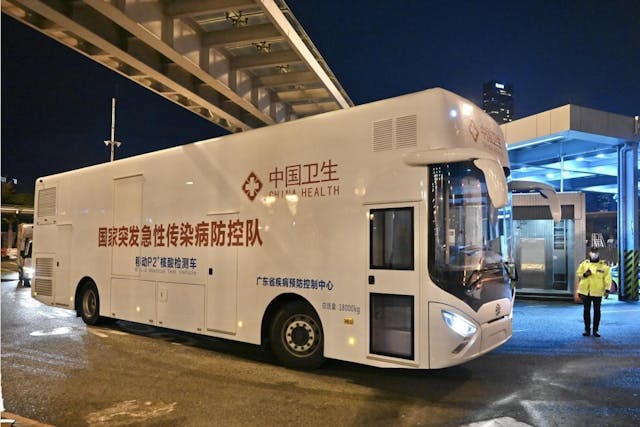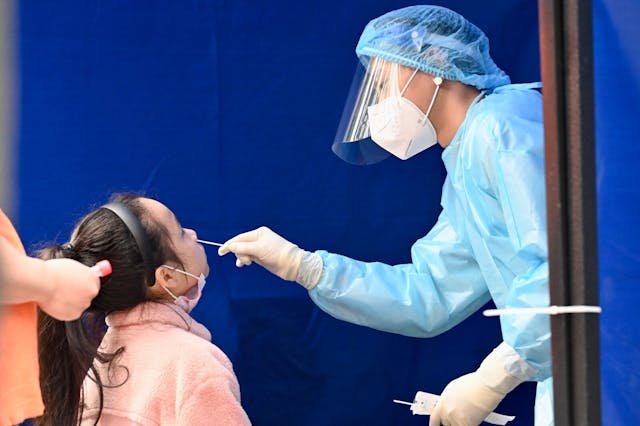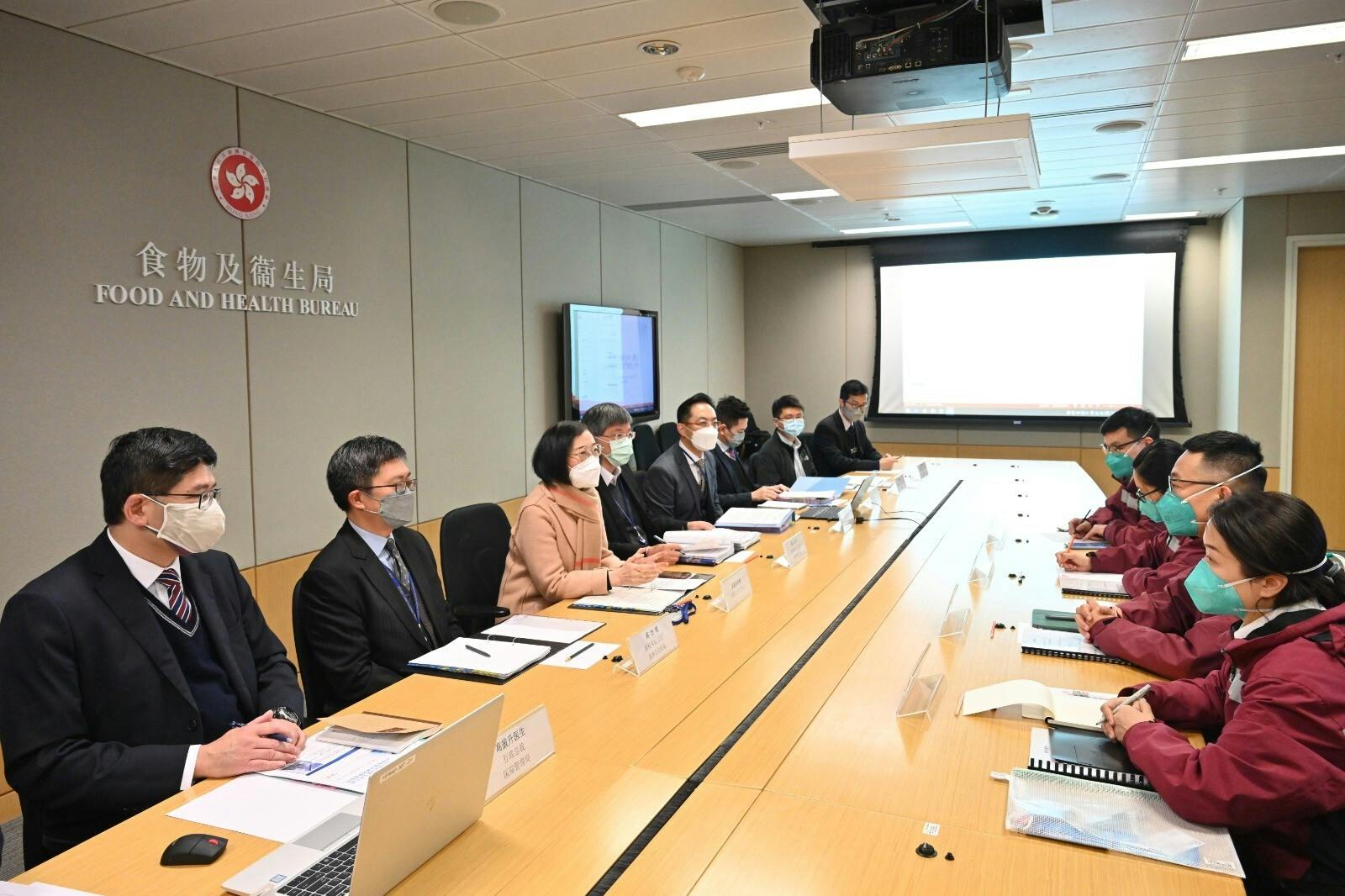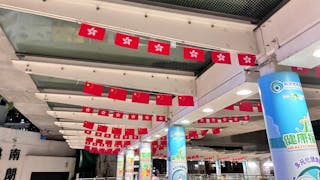感染奧密克戎(Omicron)變種病毒的患者人數突然激增,使香港陷入前所未有的衛生危機,不僅需要北京中央政府和廣東省政府的全力幫助和支持,而且還要不斷調動人力物力,以改善香港在檢測、隔離設施和住院方面的能力不足。
港府捉襟見肘 要求內地協助
2月8日,行政長官林鄭月娥透露,中央關注Omicron在香港特區的蔓延。同日就有報道,指內地專門檢測Omicron病毒的專家組成員陸續抵港。
然而,隨着確診人數不斷增加,本港醫療系統的能力已經捉襟見肘。
2月12日,保安局局長李家超率領多位局長訪問深圳,包括運輸及房屋局局長陳帆、食物及衛生局局長陳肇始、政制及內地事務局局長曾國衛、保安局局長鄧炳強。他們與內地衛生官員和港澳辦代表,就香港的疾情交換了意見。會議由李家超和國務院港澳辦副主任黃柳權主持,雙方決定成立工作組,加強協調工作。國家衛生健康委員會(衛健委)官員肯定香港特區政府過去兩年在應對新冠疫情工作方面的努力。
會議上,香港官員在以下幾方面要求內地提供協助:一、派遣專家協助本港進行病理排查及分析工作;二、提升香港的檢測能力; 三、協助建設檢疫及隔離設施;四、提供快速抗原測試套裝;以及五、提供抗疫物資如病床、家具及口罩等供應。對此,中央政府、國家衛健委、廣東省和深圳市政府均表示願意協助香港,雙方還同意成立聯合工作組以應對新冠病毒的傳播。

三方協調機制 加強粵港統籌
2月15日,新冠病毒確診病例增至5400多宗時,香港傳媒報道,國家主席習近平就支援香港抗擊第5波疫情工作提出了重要指示,習近平強調,特區政府要切實負起「主體責任」,把盡快穩控疫情作為當前壓倒一切的任務,動員一切可以動員的力量和資源,採取一切必要的措施,確保香港市民的生命安全和身體健康。與此同時,中央各有關部門和地方,特別是廣東省,要全力支持和幫助港府做好防疫抗疫工作。
國務院副總理韓正也作出指示,要求特區政府和各有關方面,堅決貫徹落實習近平的重要指示精神。具體來說,中央和廣東省要抓緊提升香港的核酸檢測能力、支援快速抗原檢測包等醫療物資、援建社區隔離和治療設施、保障鮮活食品等生活必需品供應、選派防疫專家赴港指導等請求事項。
此外,中央決定成立由港澳辦及國家衛健委牽頭的三方協調機制,加強中央部門、廣東省及港府之間的統籌。
2月16日,港澳辦主任夏寶龍在深圳主持召開支援香港抗疫工作第2次協調會,會議研究了中央政府、廣東和深圳如何落實習主席下達的指示,以助香港遏制第5波疫情蔓延。 顯然,中央有關部門、廣東省政府和深圳地方官員立即動員起來執行北京的政策指示。
2月18日,中聯辦主任駱惠寧召開視像會議,動員本地多位商界領袖表達對抗疫措施的支持,他們透過捐款、提供酒店房間作隔離設施、提供物流服務等,支持特區政府和醫護人員抗擊新冠病毒傳播。許多社會團體在本地報章登廣告,支持習近平主席的指示。
2月18日,香港特別行政區行政會議也作出決定,將行政長官選舉押後6周。行政長官林鄭月娥援引《緊急情況規例條例》,讓行政長官選舉從3月27日延遲到5月8日,因為香港目前的首要任務是對抗第5波疫情的蔓延。

遇上抗疫疲勞 缺乏協調領導
儘管中央、廣東省政府和深圳市官員無疑都表示全力支持香港抗擊新冠病毒,但在應對香港快速傳播的疫情方面,執行上存在嚴重的差距。一些私立醫院不願接收激增的確診患者;部分安老院舍拒絕接回檢測結果為陰性,或被醫護人員認為可以回到院舍的長者;醫管局在處理病人方面的表現,顯得能力不足和領導不夠果斷,許多病人晚上不得不滯留醫院外面等待進入室內。
醫管局及屬下員工儘管工作在巨大的壓力下工作,必須予以充分肯定,但他們力有不逮,也顯示公共衛生官員與各部門協調的領導能力和危機處理能力相對薄弱,他們在政策執行上似乎缺乏效率。
事實上,疲勞可能是一個問題,畢竟抗擊新冠病毒的鬥爭已經持續了兩年多。
近期感染快速傳播的Omicron病毒的患者人數突然增加,可能與以下幾方面有關:(一)過去兩年在教育動員全體人口,特別是長者和兒童接種疫苗方面的力度相對鬆懈;(二)香港主要依靠竹篙灣的檢疫設施,檢疫能力不足; (三)未能防止部分外來感染病例滲入香港;以及(四)公共衛生官員和醫院管理局缺乏強有力的協調和有效領導,他們在檢測和隔離措施的實施方面存在很大差距,必須緊急填補。
所有這些問題都在過去兩周內浮上水面,引起了一些公眾的不滿和失望。幸運的是,中央、廣東省和深圳市有關部門已經分別向香港伸出了援手。
在接下來的一個月裏,香港很可能會仿傚澳門的做法,實施全民檢測。據報道,檢測工作將要求每位市民接受3次檢測,至少開設200個中心,每天對大量居民進行檢測,拒絕接受檢測的居民將受到處罰,細節正在敲定,但這將是所有香港居民史無前例的動員,在2022年3月接受新冠病毒及其變種病毒的測試。
總之,針對第5波疫情的戰爭已經在香港打響。儘管香港在檢測能力、隔離措施和住院方面存在嚴重不足,但前景仍然謹慎樂觀,主要是由於中央政府的堅定和綜合支持,以及全力動員廣東省和深圳市有關部門。香港社會必須在未來數月同特區政府合作,以取得抗擊新冠疫情的勝利。
The War Against Omicron in Hong Kong
The sudden upsurge in the number of patients infected with Omicron has plunged the Hong Kong Special Administrative Region (HKSAR) into an unprecedented health crisis that necessitates not only the full support and assistance of the central government in Beijing and the provincial government in Guangdong, but also the ongoing mobilization of manpower and resources to increase the weak capacity in testing, quarantine and hospitalization.
On February 8, Chief Executive Carrie Lam revealed that the central authorities were concerned about the spread of Omicron in the HKSAR. On the same day, it was reported that mainland technicians specialized in the testing of the Omicron virus gradually arrived Hong Kong.
However, as the number of infected patients rose, the capacity of the Hong Kong health system was strained and overstretched.
On February 12, Secretary for Security John Lee led a number of ministers to Shenzhen, including Secretary for Transport and Housing Frank Chan Fan, Secretary for Food and Health Sophia Chan, Secretary for Constitutional and Mainland Affairs Erick Tsang, and Secretary for Security Chris Tang. They exchanged views with the mainland health official and the Hong Kong Macau Affairs Office (HKMAO) on the situation of the HKSAR. The meeting, which was presided over by John Lee and the Vice Director of the HKMAO Huang Liuquan, decided that both sides would set up sub-groups to strengthen coordination work. Officials from the National Health Commission (NHC) affirmed the efforts of the HKSAR government in dealing with the anti-Covid-19 work in the past two years.
During the meeting, the Hong Kong officials requested mainland assistance in several areas: (1) the dispatch of mainland experts to Hong Kong to assist in the process of epidemiological investigation; (2) the enhancement of testing capability in Hong Kong; (3) the construction of quarantine and isolation faciltities; (4) the supply of antigen testing kits; (5) the provision of anti-Omicron supplies such as beds, masks and protective gear. In response, the HKSAR, the NHC, the Guangdong government and Shenzhen government expressed their willingness to assist Hong Kong. Both sides also agreed to set up joint task forces to tackle the spread of Covid-19.
On February 15, when the cases of infection increased to more than 5,400, it was reported in Hong Kong that President Xi Jinping had made an important directive of assisting the HKSAR to combat the spread of Omicron. President Xi said that the HKSAR government had to shoulder the “main responsibility” of stabilizing the situation of the spreading Omicron, that it should mobilize all the available forces and resources as well as measures to protect the lives, safety and health of the Hong Kong comrades. At the same time, the central government and the local authorities, particularly Guangdong, would join the efforts at controlling the spread of Omicron.
Vice Premier Han Zheng also issued a directive saying that the HKSAR government and other related agencies should resolutely implement President Xi’s important instruction and spirit. Specifically, the central and Guangdong provincial authorities would need to grasp the issues of elevating the testing ability of the HKSAR, to provide health logistics and testing kits to Hong Kong, to help Hong Kong build up the necessary community quarantine and treatment facilities, to safeguard the supplies of fresh products, food and daily necessities, and to dispatch medical and health experts to Hong Kong to direct the joint efforts at curbing the increasing tide of Omicron.
Moreover, the central government decided to set up a triangular work coordination mechanism composed of the central health officials, the Guangdong officials and the Hong Kong counterpart to enhance coordination work.
On February 16, the HKMAO director Xia Baolong convened a coordination work meeting in Shenzhen to assist Hong Kong to resist the spread of Covid-19. The meeting studied how the central authorities, Guangdong and Shenzhen could and would implement the directive issued by President Xi to help Hong Kong curb the spread of Omicron. Obviously, immediate mobilization of the central agencies, provincial authorities in Guangdong, and the local officials in Shenzhen was made to implement the policy directive of Beijing.
On February 18, the Liaison Office director Luo Huining held a video conference in which many local business leaders were mobilized to express their support of the anti-epidemic measures, to donate money, and to provide logistical support such as hotel rooms and facilities for the HKSASR government and the hospital staff members to combat the spread of Covid-19. Many social groups advertised in the local newspapers in support of President Xi’s directive.
On February 18, the Executive Council of the HKSAR also reached a decision to postpone the Chief Executive election to six weeks. Chief Executive Carrie Lam cited the use of the Emergency Regulations Ordinance to postpone the Chief Executive election from March 27 to May 8, because the priority of the HKSAR is to fight against the spread of Omicron in the city.
Although the central authorities, the Guangdong government and the Shenzhen officials have undoubtedly shown their full support of Hong Kong to combat Omicron, there are serious implementation gaps in tackling the fast-spreading disease in the HKSAR. Some private hospitals were reluctant to deal with the upsurge in the number of infected patients; some elderly homes refused to take back the elderly people after they were either tested negative or regarded as being able to return home by hospital staff; and the Hospital Authority showed a lack of capability and decisive leadership in coping with the patients, many of whom had to stay outside hospitals at nights to wait for their entry into hospital rooms. Although the Hospital Authority and its staff members have been working under tremendous stress and full credit must be given to all of them, their lack of capacity also demonstrated the relatively weak leadership and weak crisis management ability of public health officials, whose coordination with various departments concerned appear to lack efficacy in the process of policy implementation. Indeed, fatigue could be one of the problems as the fight against Covid-19 already lasted for over two years.
The recent abrupt increase in the number of patients infected with the fast-spreading Omicron was perhaps attributable to several factors: (1) the relatively lax efforts at educating mobilizing the entire population, especially the elderly and children, to have vaccination in the past two years; (2) the insufficient quarantine capacity of Hong Kong which has relied mainly on the quarantine facilities at Penny Bay; (3) the inadequacy in preventing some externally infected cases from infiltrating Hong Kong; and, as mentioned before, (4) the lack of strong coordination and effective leadership of the public health officials and the Hospital Authority, whose implementation of testing and quarantine measures demonstrated considerable gaps that have to be plugged urgently. All these problems have surfaced in the last two weeks, leading to some public dissatisfaction and disappointment. Fortunately, the central, provincial and local authorities in Beijing, Guangdong and Shenzhen respectively have been extending their helping hands to Hong Kong.
In the coming month, Hong Kong would very likely follow Macau’s example of implementing the testing of the entire population. It has been reported that the testing efforts would require each citizen to undergo three tests, that at least 200 centers would be opened every day to test a large number of residents on a daily basis, and that residents who refuse to undergo testing would be penalized. Details are being finalized, but this will be an unprecedented mobilization of all Hong Kong residents to undergo the testing of Covid-19 and its variants in March 2022.
In conclusion, the war against Omicron has begun in the HKSAR. Although there are serious implementation gaps in the testing ability, quarantine measures and hospitalization of Omicron-infected patients in Hong Kong, the outlook remains cautiously optimistic mainly because of the staunch and combined support of the central government in Beijing together with the full mobilization of the Guangdong and Shenzhen authorities. The society of Hong Kong must be cooperative with the HKSAR authorities in the coming months so that the war against Omicron will be victorious.
原刊於澳門新聞通訊社(MNA)網站,本社獲作者授權轉載。





































